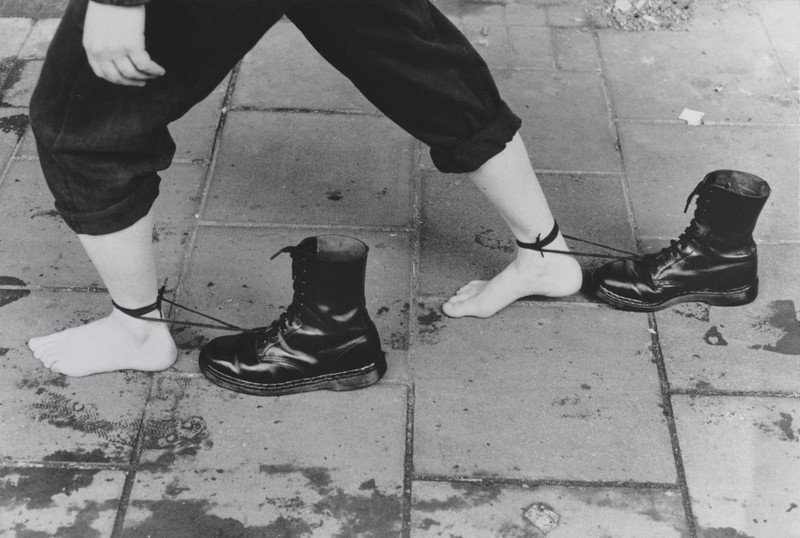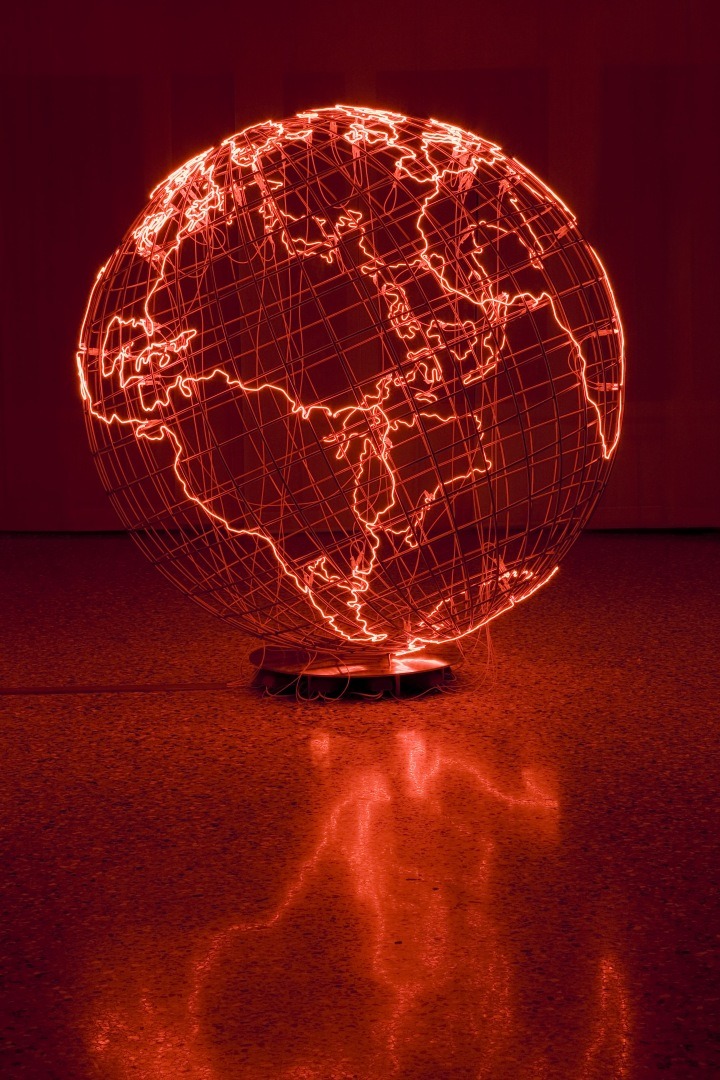Mona Hatoum
04 May - 21 Aug 2016

© Mona Hatoum
Performance Still 1985, printed 1995
Photograph, gelatin silver print on paper, mounted on aluminium
764 x 1136 mm
Presented by Tate Patrons 2012
Performance Still 1985, printed 1995
Photograph, gelatin silver print on paper, mounted on aluminium
764 x 1136 mm
Presented by Tate Patrons 2012

Mona Hatoum, Hot Spot III 2009 © Mona Hatoum. Photo: Agostino Osio. Courtesy Fondazione Querini Onlus, Venice
In May 2016 Tate Modern opens the first UK survey of the work of Mona Hatoum (b.1952), one of the most important artists of her generation. Drawing on her expansive career, this exhibition will reflect 35 years of consistently poetic and radical thinking expressed through a diverse range of media. The exhibition will present over 100 works from the 1980s to the present day, from early performances and video, sculpture, installation, photography and works on paper.
Mona Hatoum is well known for her large-scale installations and sculptures which challenge the formal languages of Minimalism and Surrealism to expose a world characterised by conflicts and contradictions. She began her career in the 1980s with performance and video works in which the body gave expression to a divided reality, besieged by political and social control. In the video Roadworks 1985, she documents a performance where she walked barefoot through the streets of Brixton with a pair of Dr. Marten boots tied to her ankles.
The body has always been central to Hatoum’s work and she is known for referencing its vulnerability and resilience, as exemplified by Corps étranger 1994, an endoscopic journey through the interior and exterior landscape of the artist’s own body. Her installations also situate the body as subject to power or incarceration, evident in Impenetrable 2009, a suspended square formed of hundreds of delicate rods of suspended barbed wire, and the iconic Light Sentence 1992. In this work, walls of industrial wire mesh lockers and a single moving lightbulb create dramatic shadows that transform the gallery into a disorientating and unstable place. Furniture and other familiar objects feature prominently in her work, often modified and scaled up, to explore the fine line between the familiar and the uncanny. Homebound 2000, for example, consists of an assemblage of kitchen utensils and household furniture connected by electric wire, through which runs an audible electric current.
Hatoum’s work highlights the condition of displacement, shared by many in the modern era.
Present Tense 1996 is made from 2,200 cubes of traditional olive oil soap from Nablus, a city north of Jerusalem. Lines of tiny red glass beads pushed into the surface depict the map of the 1993 Oslo Peace Accord between Israel and the Palestinian Authorities. In the recent installationTwelve Windows 2012-13, comprising twelve pieces of embroidery made by Palestinian women living in refugee camps in Lebanon, embroidery becomes an act of resistance. Organised and produced by Inaash, a Lebanese NGO, these delicately embroidered ‘windows’ are suspended on crisscrossing steel cables, each one representing a key region of Palestine through their unique motifs, stitches, colours and patterns.
Born in Beirut in 1952 to a Palestinian family, Mona Hatoum settled in England in 1975 after war broke out in Lebanon. She is represented in major collections around the world and recent solo exhibitions include Fondazione Querini Stampalia, Venice (2009); Kunstmuseum, St Gallen (2013); Mathaf: Arab Museum of Modern Art, Doha (2014); and Pinacoteca do Estado de São Paulo (2015). She has shown at the Venice Biennale (1995 and 2005) and Documenta XI, Kassel (2002). Hatoum was nominated for the Turner Prize in 1995; received the Joan Miró Prize 2011; and will be awarded the Hiroshima Art Prize in 2017.
Mona Hatoum is curated by Clarrie Wallis, Curator of Modern and Contemporary British Art, Tate and Christine Van Assche, Honorary Curator, Centre Pompidou, Paris with Katy Wan, Assistant Curator, Tate Modern. The exhibition is organised by the Centre Pompidou, Musée National d’Art Moderne, Paris, in collaboration with Tate Modern, London and the Finnish National Gallery / Museum of Contemporary Art Kiasma, Helsinki. It will be accompanied by a catalogue from Tate Publishing and a programme of talks and events in the gallery.
Mona Hatoum is well known for her large-scale installations and sculptures which challenge the formal languages of Minimalism and Surrealism to expose a world characterised by conflicts and contradictions. She began her career in the 1980s with performance and video works in which the body gave expression to a divided reality, besieged by political and social control. In the video Roadworks 1985, she documents a performance where she walked barefoot through the streets of Brixton with a pair of Dr. Marten boots tied to her ankles.
The body has always been central to Hatoum’s work and she is known for referencing its vulnerability and resilience, as exemplified by Corps étranger 1994, an endoscopic journey through the interior and exterior landscape of the artist’s own body. Her installations also situate the body as subject to power or incarceration, evident in Impenetrable 2009, a suspended square formed of hundreds of delicate rods of suspended barbed wire, and the iconic Light Sentence 1992. In this work, walls of industrial wire mesh lockers and a single moving lightbulb create dramatic shadows that transform the gallery into a disorientating and unstable place. Furniture and other familiar objects feature prominently in her work, often modified and scaled up, to explore the fine line between the familiar and the uncanny. Homebound 2000, for example, consists of an assemblage of kitchen utensils and household furniture connected by electric wire, through which runs an audible electric current.
Hatoum’s work highlights the condition of displacement, shared by many in the modern era.
Present Tense 1996 is made from 2,200 cubes of traditional olive oil soap from Nablus, a city north of Jerusalem. Lines of tiny red glass beads pushed into the surface depict the map of the 1993 Oslo Peace Accord between Israel and the Palestinian Authorities. In the recent installationTwelve Windows 2012-13, comprising twelve pieces of embroidery made by Palestinian women living in refugee camps in Lebanon, embroidery becomes an act of resistance. Organised and produced by Inaash, a Lebanese NGO, these delicately embroidered ‘windows’ are suspended on crisscrossing steel cables, each one representing a key region of Palestine through their unique motifs, stitches, colours and patterns.
Born in Beirut in 1952 to a Palestinian family, Mona Hatoum settled in England in 1975 after war broke out in Lebanon. She is represented in major collections around the world and recent solo exhibitions include Fondazione Querini Stampalia, Venice (2009); Kunstmuseum, St Gallen (2013); Mathaf: Arab Museum of Modern Art, Doha (2014); and Pinacoteca do Estado de São Paulo (2015). She has shown at the Venice Biennale (1995 and 2005) and Documenta XI, Kassel (2002). Hatoum was nominated for the Turner Prize in 1995; received the Joan Miró Prize 2011; and will be awarded the Hiroshima Art Prize in 2017.
Mona Hatoum is curated by Clarrie Wallis, Curator of Modern and Contemporary British Art, Tate and Christine Van Assche, Honorary Curator, Centre Pompidou, Paris with Katy Wan, Assistant Curator, Tate Modern. The exhibition is organised by the Centre Pompidou, Musée National d’Art Moderne, Paris, in collaboration with Tate Modern, London and the Finnish National Gallery / Museum of Contemporary Art Kiasma, Helsinki. It will be accompanied by a catalogue from Tate Publishing and a programme of talks and events in the gallery.
